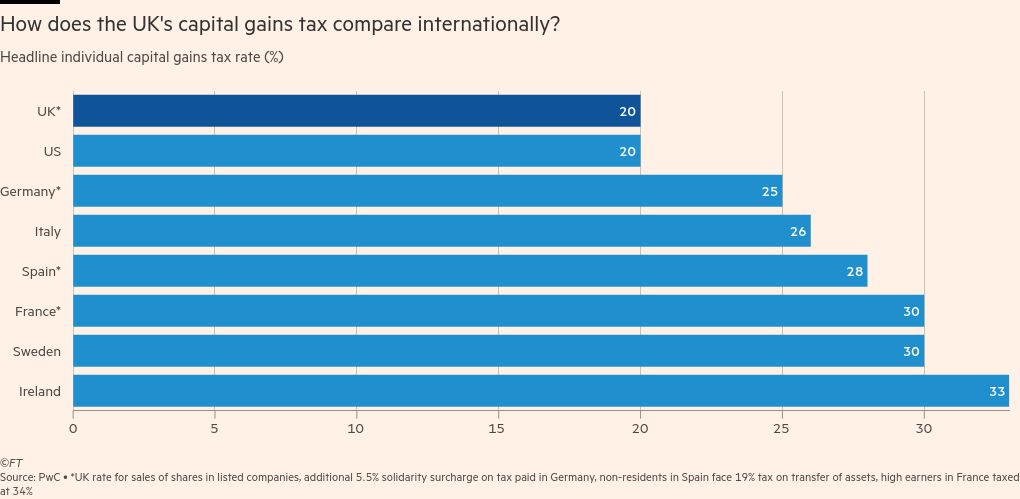
Fears the UK government will raise capital gains tax (CGT) in its October Budget have fuelled frenzied selling activity by business owners and investors.
Chancellor Rachel Reeves has given no indication as to what, if anything, a future rate rise could entail. But some — including the now defunct Office for Tax Simplification — have argued raising CGT rates closer to income tax rates could generate billions in extra revenue.
Charging CGT at the same level as income tax is an approach some countries, such as Australia, Denmark, Luxembourg and Hungary, take. However, several countries do not levy CGT.
How is CGT taxed around the world?
CGT is a complex tax, and it is hard to compare directly as many countries have specific reliefs and exemptions for different types of assets, holding time and transactions.
For instance, the highest tax rate on capital gains in Australia is 45 per cent (the top income tax rate). But the regime also allows for a 50 per cent discount on the gain for assets held over 12 months.
Nordic nations typically have some of the top CGT rates, with Norway charging a headline rate of 37.84 per cent and Sweden and Finland 30 per cent. Denmark’s rate is among the highest in the world at 42 per cent.
Alex Mengden, global policy analyst at the Tax Foundation think-tank, argues such high rates cause “a very strong disincentive to save for things like retirement”.
In contrast, several jurisdictions including the Bahamas, Belgium, Bermuda, the Cayman Islands, Gibraltar, Hong Kong, Jersey, Guernsey, the Isle of Man, the Netherlands, New Zealand, Qatar, Saudi Arabia, Singapore and the UAE do not charge CGT at all. In Switzerland, the sale of private assets is also generally free of CGT. However, its cantons often impose wealth taxes and gift and inheritance taxes.

How does the UK compare to other countries in terms of CGT?
In the UK, CGT of between 10 and 24 per cent is charged on gains from business assets, shares and properties that are not the primary home. The highest rate of CGT is 28 per cent for carried interest, the cut of gains private equity investors make on successful deals, although the government has indicated it plans to change the treatment of carry.
The UK’s CGT rates are currently mid-range for sales of shares held for the long term among most developed countries. According to the Tax Foundation, the average rate on these assets among OECD countries is 19.7 per cent and 27.32 per cent for G7 countries.
Research by the OECD found most OECD countries have CGT rates significantly lower than income tax rates — a pattern the UK conforms to. The top income tax is 45 per cent in England, Wales and Northern Ireland and 48 per cent in Scotland.
However, tax experts point out the UK is unusual in how it taxes income derived from capital.
Dan Neidle, founder of the Tax Policy Associates think-tank, says: “It has one of the highest rates of income tax on dividends — higher than France, Portugal, Italy, Spain, which is surprising.”
The top UK rate of income tax on dividends is 39.35 per cent. In contrast, the rate of CGT on sales of shares is 20 per cent. “This is a large gap, and encourages significant avoidance,” Neidle adds. To prevent avoidance, he thinks the government would be right to raise the level of CGT but not as high as to income tax levels.
What rate should the UK adopt in a competitive world?
Pascal Saint Amans, former head of tax at the OECD, agrees countries that tax dividends should aim to levy “consistent” rates on capital gains — to prevent people structuring income as gains to avoid tax. Though he acknowledges, in practice, they are not always consistent.
If the UK raised its CGT rate to the same level as its top dividend rate of 39.35 per cent, this would place it among the highest in the G7.
Meanwhile, if it raised it to the same level as the highest income tax rate levied in England of 45 per cent this would put it among the highest in the world alongside Denmark, Chile, Turkey and Uganda.
Mengden says a CGT rate above 40 per cent would discourage investment in the UK particularly by entrepreneurs aiming to ultimately sell their businesses to large multinationals.
Several advisers said a new CGT rate of about 30 per cent would be the most they thought the UK should levy.
This is similar to France which charges 30 per cent, rising to 34 per cent for high earners, Ireland which charges 33 per cent and Germany which charges 25 per cent, plus a 5.5 per cent solidarity surcharge on the tax paid.
How much would a CGT rate rise influence wealthy people and entrepreneurs?
Tax is only one factor affecting investors and entrepreneurs’ decisions, making it challenging to assess whether they would vote with their feet and leave the UK.
“For some people just a 1 per cent rise in CGT rates could be seen as “the thin end of the wedge”, whereas others might accept a 10 per cent rise as “not as bad as it could have been”, says Elsa Littlewood, partner at BDO.
Nevertheless, she and several other advisers said a very large increase would have a negative impact. Figures released by HM Revenue & Customs in June seem to bear this out. They estimated that a 10-percentage point rise in CGT rates would result in a £2bn loss to the Treasury in the 2027-28 tax year.
Others argue that so long as any system is well-designed, there is room to increase CGT rates without detriment to the UK economy. But there are risks, particularly as the UK has taken a hit to its reputation as a politically and economically stable country in recent years.
“The chancellor might be well advised not to push too hard on CGT at the risk of making the UK appear closed for business,” warns Ed Cubitt, associate at law firm Withers.